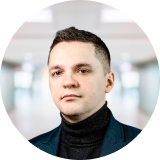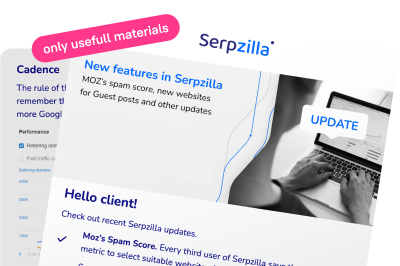Regarding link building, it’s absolutely true that having a bad strategy is better than having no strategy at all. The success of your work depends largely on how well you’ve thought out the link building process for the site you’re promoting.
Undertaking link building without a well-thought-out link strategy is a serious mistake, often made by novice Publishers. To develop a suitable strategy, a series of steps must be followed.
Link building strategy in steps
Step #1: Analyze the Site
The first step is to identify the strengths and weaknesses of your site. This is necessary to understand whether to focus more on link building or semantic analysis. The weaker aspect should be addressed first.
Step #2: Define Your Target Audience
Understanding your audience helps you know which sites they frequently visit and where it’s best to place links. This analysis should focus on:
- Demographic segmentation of the audience
- User habits and interests
- Key problems and questions that interest site visitors
- Reasons for their interest in your products and services
- How your audience searches for information
Step #3: Analyze Site Content
Links from other sites often don’t lead directly to product pages to avoid appearing sponsored or spammy. Ensure you have content that can be linked to. Also, review competitors’ sites to see how they formulate content and compare it with yours. Identify any gaps and address them, like creating additional pages or sections.
Step #4: Compile a List of Donor Sites
You can’t know exactly which sites will link to you, but forming a preliminary list of resources from which you’d like to get mentions will simplify your work later. Consider important parameters for you: traffic volume, thematic relevance, trust according to search engines, etc.

Popular Link Building Strategies and Tactics
A link strategy is a long-term action plan, such as increasing organic traffic or social media citations. The strategy itself determines how you will achieve the final goal.
A link tactic is a step or steps aimed at ensuring the success of the link strategy. It has a clear purpose and is significantly more time-bound. For example, if you want to increase citations in social networks, a tactic could be to place three social links weekly.
Popular Link Building Strategies Link promotion requires time and effort. Choose a strategy focusing on the final result, as even popular techniques may fail otherwise. Evaluate the chosen strategy regularly to ensure it’s working as intended and fits the current situation.
The choice of strategy is individual and depends greatly on the site’s specifics, niche, and region. Often, even well-established methods require customization. However, some strategies have proven effective in many cases and can be applied almost unchanged.
Publishing Attractive Content
This strategy involves regularly posting content on your site that users and other resources frequently link to, such as:
- Guides and life hacks
- Trending articles
- Unique industry research
- Educational articles
- Entertaining or inspiring materials
- Evergreen content
If you produce highly relevant and unique materials, other sites will enthusiastically link to them. Some SEO specialists focus on audience-relevant issues and create content with ready answers. However, simply providing answers is insufficient — the uniqueness of the material is key.
Announcing yourself may not be easy — consider purchasing social or Guest Posts that highlight your content and its features to a wide audience.
Outreach Publishers can request other sites to link to their content. Find relevant or related-topic resources and negotiate with them. Often, these services are done on a barter basis, as other sites are also interested in increased citations and traffic growth.
SEO specialists often need to prove their site deserves a mention by directly contacting portal administrators and sending their materials. Common approaches include:
- Sending press releases
- Promoting new content
- Seeking existing unlinked mentions
This approach involves diplomatically building relationships with unfamiliar or slightly known people, so clarity and conciseness in requests are vital. The initial difficulty lies in obtaining the first links this way, but as citation and popularity grow, the situation becomes easier.
To simplify the task, consider purchasing links from authoritative resources using proven link-building platforms like Serpzilla. This first step can subsequently facilitate site promotion through outreach.
Creating News Opportunities
Getting links from news sites has several advantages. One is that search engines often don’t perceive a sudden increase in such links as manipulation.
Combine natural link acquisition with a one-time purchase of a large number of paid news-type links, avoiding penalties from Google. For example, if you have a relevant news opportunity, purchase a significant number of Guest Posts on information portals and social links to increase social media citations. If all these mentions link to your original news, search engines won’t consider the explosive growth of the link profile unnatural.
News resources have large audiences, and any link can lead to significant traffic growth. The link weight of such mentions is also substantial.
News opportunities vary greatly depending on your site’s theme. In some cases, announcing new products is relevant, in others, offering workshops or promotions. Look at what occasions other sites in your niche offer their audience.
Technical Optimization of Links
Remember, links can break for trivial reasons, such as page closures or content transfers. The site owner that the links lead to is primarily interested in their relevance. Those who placed them might not know they lead nowhere.
Thus, periodically audit all incoming links as you progress with link building. Using Google Search Console and other services can help check their correctness.
If you find a broken link, you can ask the Publisher who placed it to correct the error, e.g., provide a new URL or point out a typo. Also, consider removing redirects, especially if they worked incorrectly. Redirects are generally considered of little use for increasing your site’s search engine ranking. Also, problems can arise when transitioning from HTTP to HTTPS.
Overall, this strategy is supplementary, but if you haven’t monitored the correctness of links, it can be exceptionally useful.
Promotion Through Expertise
If you have high expertise in your field, your potential for link promotion increases significantly. Any content you publish is likely to be cited, and the number of incoming links will constantly grow.
However, expertise requires recognition, which is the main difficulty. If you already have it, the task is much simpler; otherwise, you’ll need to earn the necessary authority. Common ways to increase your expertise include:
- Publishing Q&A format materials
- Being active on social networks
- Posting articles on guest blogs on other sites
- Conducting webinars and master classes
Guest Blogging
One of the best opportunities for free high-quality links is creating quality materials for placement on external resources, usually of similar topics. By developing a smart guest blogging strategy, you can regularly publish such articles and notes, adding links to your own site. If placed wisely, e.g., in relevant materials without spamming the text, you can achieve a very high-quality effect.
When choosing sites for material placement, consider using the Link Authority service to determine the domain weight — the higher this parameter, the better your resource will rank due to incoming links from this source.
Partner and Distributor
Links Most businesses form partnerships with other companies. Use this in your link-building strategy. If you have business partners or, for example, are an official dealer of a brand, ask them to place a link to your site, or perhaps even create a dedicated page about you.
The stronger your ties and more reliable your relationships, the more likely this plan will succeed, and you’ll get a quality addition to your link profile. Your site can also link to a partner’s, so this exchange can be mutually beneficial.
Supplementing Non-Linked Mentions
This is another way to legally and freely get a deserved quality link. As your business’s fame grows, the number of its mentions online will naturally increase. But many of these will be limited to brand name mentions without attached links.
Therefore, you need to directly contact the owners of websites and blogs, as well as authors of posts mentioning your brand, and ask them to back it up with a link to your resource.
This applies not only to brand mentions but also to any intellectual property types. For example, if it concerns research or material you created, you also have the right to ask for a direct link to your site. For easy mention searching, consider using services like Google Alerts or similar.
Niche Influencers
Every industry has certain influencers you can approach for quality links. Understand, however, that their services require budget investments, which can vary significantly depending on the influencer’s level. Sometimes a barter agreement is possible.
Despite the cost, this option not only improves site ranking but also significantly increases direct traffic. Such investments will surely pay off.
If you start working with an opinion leader, think in advance about the approach for each integration. For example, prepare material based on which the chosen influencer can easily make a publication containing a link. Thus, some companies pre-formulate announcements or releases targeting a specific source.
Creating Engaging Visual Content
This recommendation relies on internet users’ psychology. If you create interesting and original visual content, such as witty and memorable comics related to your brand, the likelihood they will be distributed online increases. You might even create viral content that becomes a meme and gains wide regional or global fame. In any case, you’ll see a significant expansion of your link profile and additional traffic to your site.
Publishing Research
Research is one of the most useful types of content for getting links. Netiquette obliges users to link to the research source when publishing any data, so getting a link in this case is guaranteed.
The likelihood that your research will gain wide publicity and distribution directly depends on its authoritativeness, timeliness, and relevance. You should also choose the format and platform for initial promotion of your research to make it known to as wide an audience as possible and subsequently cited more often.
Developing Free Tools and Services
This option suits companies actively working on various software. In this case, you can create and distribute a free tool demanded by your audience.
An alternative is to create a free demo or a simplified version of an existing paid service. Many large companies, such as Adobe, actively use this technique. The more intensively the tool you create is distributed and used, the more quality links to your resource you will receive.
Publishing Guides
Various guides are convenient because they can be published on topics and about any products. Current and useful instructions, especially step-by-step ones, are actively distributed online and are a valuable source of free links. The main advantage of this method is its universality and accessibility. Just choose a popular topic and publish a simple, clear, and easy-to-use guide.
Reference Mentions
This method is one of the simplest and, although not the most effective, it is convenient because it does not require financial expenses and is available to the vast majority of companies. There are many different business directories, both general and industry-specific — each company can leave their details there, including a link to their resource.
It makes sense to specify links in company cards on mapping services and various applications, such as Google Business. Official social network pages can also link to the main site, and all such mentions will positively affect ranking.
Getting Links through PR
When you promote your company using various PR tools, you also get good opportunities for backlink placement. For example, every press release or article you publish about the company’s activities can contain embedded links. Of course, some media may refuse to place a link, so the wider the coverage and the more different channels you use, the stronger your site’s link profile will become.
Publishing materials also accomplishes other tasks, such as increasing your expertise and recognition. This also contributes to improving your site’s positions in search results. Therefore, try to build or maintain your presence in the media field. You can start with social networks. There you can similarly expand your presence and use it to add additional links to the main site.
Another method to strengthen content is to attract external experts for their opinions or thematic insights. Additionally, you can organize mutual citing and subsequently regularly place links on other resources.
Caution in Choosing Strategy
Despite the abundance of link-building methods, there are certain precautions to follow to avoid harming your site. Not all link-building methods are relevant and useful today.
Thus, you should not blindly chase the number of links, especially not resort to “bulk” purchases. The fact is that such services often imply rather dubious sources: donor sites of insufficient quality or even under penalties by search engines. It’s better to purchase fewer quality links than to put your resource at risk of exclusion from search results.
Conversely, don’t assume that if you managed to purchase one or two valuable, expensive links from major authoritative portals, you’ve already made a significant step in promoting the site. It’s quite possible that search engines won’t attach much importance to this, and you won’t progress in the rankings.

Remember, link building is a regular and, importantly, systematic work. If you purchase links, maintain the naturalness of your profile. Plan in advance what types of links and in what quantity you will be placing. In this case, search engines will assess your growth as natural and will not take penal measures.
For example, complement rental and Guest Posts with links from social networks, as well as crowds – mentions in forums and comments. This is how the profile of a growing and developing



